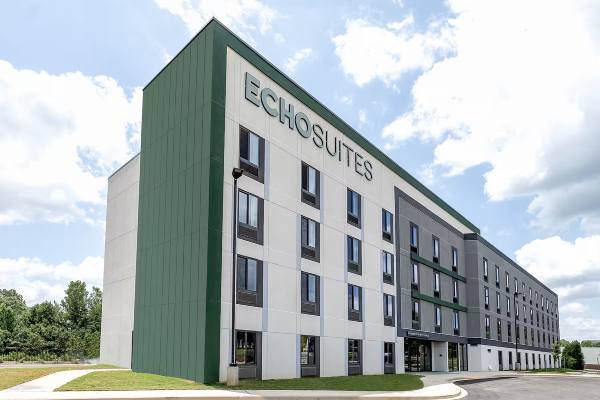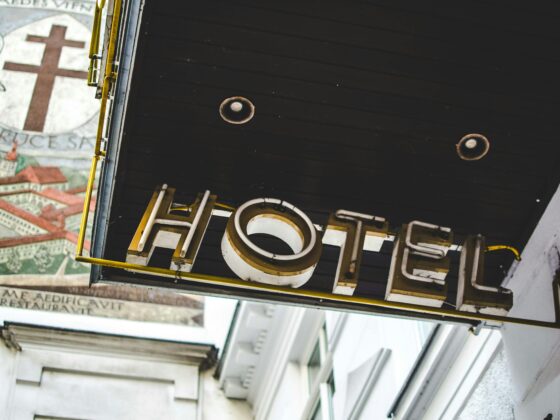Wyndham Hotels & Resorts is a stalwart of the economy hotel segment—always has been, ever since its origins and core four brands of Days Inn, Super 8, Howard Johnson and Ramada. Today, the company, which spun off from Wyndham Worldwide in 2018, has 25 brands and has made a concerted effort to move up the chain scales, while still remaining true to its lower-segmented business. And while that segment flourished post-COVID, torpid growth and performance has caught up to it four years after, something Geoff Ballotti, president and CEO of Wyndham Hotels & Resorts, alluded to on his company’s second-quarter 2024 earnings on Thursday.
“We believe that the current RevPAR environment is transitory in nature despite the occasional downturn,” he said, adding that since 2000, and through four lodging cycles, U.S. RevPAR for the select-service segments has grown at a 2.6% compounded annual gross rate.
In June, STR projected RevPAR growth of 2% for 2024 and 2.6% for 2025 across all chain scales, but in the midscale and economy segments, it forecasted negative RevPAR growth of -1.2% and -3%, respectively. “We have seen a bifurcation in hotel performance over the first four months of the year, which we don’t believe will abate soon. The increased cost of living is affecting lower-to-middle income households and their ability to travel, thus lessening demand for hotels in the lower price tier,” said STR President Amanda Hite.
The upshot for Wyndham is a renewed focus in the economy segment, but in extended-stay product, where it launched Echo Suites Extended Stay by Wyndham in 2022 and opened its first, in Spartanburg, S.C, in early July. Echo Suites’ development pipeline now stands at more than 270 properties.
On the earnings call, Ballotti and CFO Michele Allen were asked about the lack of new supply growth in the economy segment and the overall shape of it, with the former citing older legacy economy hotels being repurposed for other uses. “If you look at economy supply over the last few years, it’s down between 1% and 2%, as those older legacy hotels move out of the system, and many of them are in urban, downtown areas,” Ballotti said.
Ballotti added that Wyndham did experience its high economy hotel addition rate in 2023—Days Inns and Super 8s—because of “how well those brands performed in the downturn in terms of the cash-on-cash returns,” adding that gross additions for the second quarter were up about 3%.
Allen returned to Echo Suites and economy, extended-stay, in particular. “New supply for many years is growing in extended-stay, projected to grow 6% annually over the next several years, and that’s where our growth strategy has been focused for the economy segment, with more than 33,000 rooms in our pipeline,” she said.
Further Echo Suites signings include three in Kentucky (Louisville, Lexington and Frankfort) and Clarksville, Ind.
On the full development front, Wyndham opened more than 18,000 rooms in the quarter, 16% more room openings domestically than last year. Ballotti said its franchise sales team in the U.S. signed 33% more development deals in the quarter than last year, which helped grow Wyndham’s global development pipeline for the 16th consecutive quarter by 740 basis points year over year to a record 245,000 rooms.
Internationally, Wyndham increased net rooms 8% versus prior year, with its EMEA team opening more than 20% more rooms than in the second quarter of last year. Its India pipeline grew by over 6% YOY, while in China, net rooms increased by 3% sequentially and by 12% versus the prior year on a direct franchising basis with new openings, including three Microtels.
Overall performance internationally was strong with RevPAR increasing 7% compared to the prior year.
Tech Front
Beyond growth prospects, Wyndham is focused on technology to help increase franchisee revenue through Wyndham Connect, which it rolled out this summer, and is designed to enhance the guest experience through mobile-centric tools that leverage AI-driven large language models. Nearly 2,000 hotels in North America have started using it.
Ballotti underscored it, especially its upselling capabilities and ability to speed up processes. “Smart, mobile check-in is speeding up the checking-in process for guests and front-desk agents, helping to verify guest information in advance and protecting owners from expensive chargebacks and reducing overall labor needs,” he said, citing one practical instance where the technology is already paying off. At the Spartanburg Echo Suites opening was Wyndham’s Development Council and what developer wouldn’t want to get into their room earlier if available? Wyndham Connect tools allow guests to check in prior to the traditional time of 3pm, if available, by paying, in this case, a $20 fee. “It was a no brainer to anybody checking in early to the hotel and it is money in that developer’s pocket,” Ballotti said.
Other advances of Wyndham Connect allow for upselling late checkouts and room upgrades, such as on higher floors or corner rooms with better views, and pre-selling various F&B options and other amenities to be placed in the room before guests arrive. Ballotti pointed to roughly $1,400 in monthly monetization opportunities on early check-in and late check-out, alone, and new AI-generated messaging that allows franchisees to communicate with and respond to guests via text message before, during and after their stays. “We’re bringing technology typically offered in luxury and upscale segments to select-service hotels, helping franchisees manage their businesses more efficiently and creating more meaningful guest experiences,” he said.
Royal Returns
Wyndham’s business is also improving on the fee front, it said. Royalty rates, or the percentage of gross room revenue that franchisor’s charge for things like use of trade name, service marks, associated logos, goodwill and other franchise services, are growing at Wyndham. It noted that global royalty rate increases are yielding incrementally around $15 million of adjusted EBITDA opportunity by 2026. “It reflects the great work of our franchise sales and development teams bringing in higher-fee deals for our brands,” Ballotti said.

Much of Wyndham’s optimism hinges on the $1.2-trillion Infrastructure Investment and Jobs Act that is believes can be around a $3.3-billion opportunity for its owners and developers, with many of these projects taking months or years to complete. It’s Wyndham’s sweet spot, with traveling workers needing both midweek and long-term value-oriented options. At the same, travel sentiment continues to thrive, now up 400 basis points from where it was at the end of last June, Ballotti said. “We’re not seeing any any difference in who’s checking into our hotels. Our middle-income guests have higher wages and savings than they had back in 2019 and we’re seeing longer lengths of stay,” he said.
Ballotti cautioned that there has been some normalization in what he called “those first-to-recover beach and mountain destinations, such as Florida, California or Colorado, which were all down a little bit.” Alternatively, he said, there has been continued demand and increases in oil and gas markets like Texas, New Mexico, Ohio, Louisiana, West Virginia and North Dakota. “In the second half, we were seeing crews continue to come back into these markets and natural gas continues to recover with production in many of those states back to where it was at their peak,” Ballotti said. “We’re feeling good about the second half.”









